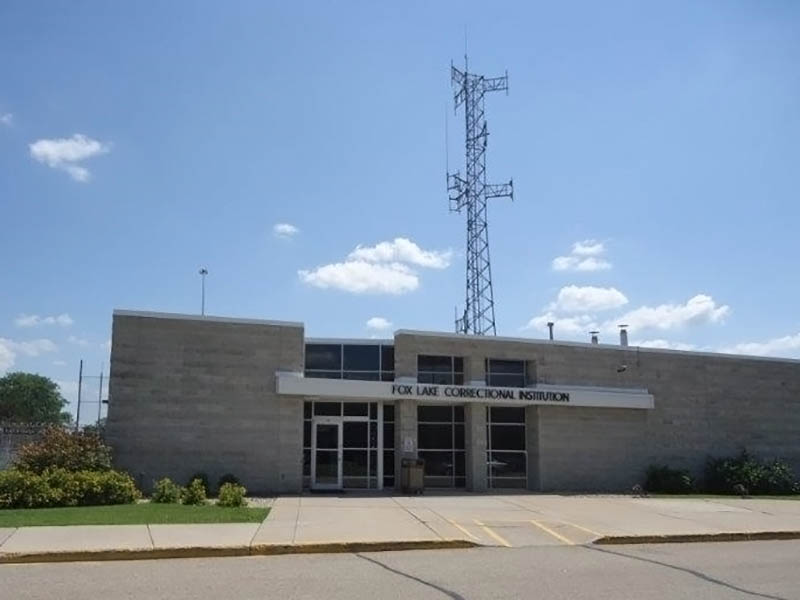State Prison Population Expected To Surge
Report projects a rise to pre-pandemic levels, rising from 19,377 inmates to 23,471 by 2023.

Fox Lake Correctional Institution. Photo from the Department of Corrections.
The state’s prison population will return to pre-pandemic levels as courts reopen and the Department of Corrections (DOC) accepts more people convicted of crimes into the prison system, according to the non-partisan Legislative Fiscal Bureau (LFB).
During the pandemic, to slow the spread of COVID-19 in prisons, the state stopped accepting newly sentenced people. Instead, they sat in county jails. Now that the COVID-19 crisis is easing, the state is again accepting new inmates, the LFB said in a budget paper. And in March, DOC secretary Kevin Carr told county sheriffs the admission backlog should be cleared within a few months.
“Legislation from the 2019 session (which increased penalties and created additional crimes) may eventually lead to increased prison populations to the extent that offenders either serve new or longer sentences,” the agency said. “No legislation was passed in the 2019 session that could cause a significant decrease in populations.”
An expansion of the Earned Release Program, an early release treatment program for persons who are incarcerated with substance abuse disorders, may eventually help reduce the population somewhat, but any impact probably will not be felt for some time, the LFB said.
It projected the average daily prison population would hit 23,471 by the end of 2022-23, the same as in February, 2020, the most recent pre-pandemic population.
As of Friday, Division of Adult Institutions population was 19,377.
“While admissions to prison are increasing and COVID-19 positive cases are decreasing, the biggest lingering COVID-19 impact on the adult prison population relates to court operations,” the paper said. “Case backlogs due to COVID-19, including trials and sentencing hearings, will likely take some unknown amount of time to address.”
News reports indicate Dane County has a backlog of 8,000 cases; in Milwaukee County, the backlog could take up to two years to clear, the report said.
“According to the Milwaukee County DA, more than 3,000 suspects are awaiting official criminal charges…and only 60 criminal jury trials were heard in the past year, down “hundreds” from a typical year.” the report said.
The state courts office reported that pending felony cases were up 35% statewide last year, LFB said.
The Joint Finance Committee, early in the budget process, eliminated several of Evers’ corrections proposals that could have reduced the prison population. They included:
Earned Release Compliance Credit
The governor proposed that most people whose supervision is revoked be given one day of credit on their sentence for each day they were on supervision.
Extended Supervision Modifications
The governor proposed that a judge be allowed to cut a term of extended supervision if: (1) DOC petitions the court to do so; (2) the person completed three years or 50% of extended supervision, whichever is less; (3) the person satisfied all conditions of extended supervision set by the sentencing court and by DOC; (4) the person fulfilled all financial obligations to his or her victims; and (5) the person is not required to register as a sex offender.
The victim(s) involved would be notified of the reduction request.
Maximum Sentence Modifications for a Class D Felony
The governor proposed reducing the maximum bifurcated sentence for a Class D felony from 25 years to 20 years. The proposal also would reduce the maximum term of extended supervision for those offenses from 10 years to five years.
Under current law, the total maximum sentence for a Class D felony committed on or after February 1, 2003, is 25 years – 15 years in prison and 10 years on supervised release. The governor’s proposal would keep the 15-year prison maximum, but reduce to five years the maximum term of extended supervision.
Sentencing Review Council
The governor proposed establishing a council to: (a) study criminal penalties and make recommendations for reforming the criminal code; (b) study whether sentences for similar offenses and circumstances are consistent and make recommendations to ensure equity; (c) study and make recommendations regarding the state’s bifurcated sentencing structure; and (d) review and make recommendations regarding sentences for violations committed by individuals age 18 to 25.
Age of Juvenile Jurisdiction
Evers wanted to raise from 17 to 18 the age young people are considered adults in state and municipal courts.
Original Jurisdiction of the Adult Court Over a Juvenile
The governor proposed eliminating adult court original jurisdiction over a juvenile. Now adult courts have original jurisdiction in four instances: when a juvenile who is over the age of 10 and accused of committing or attempted to commit first-degree intentional homicide or committed first-degree reckless homicide or second-degree homicide; when a juvenile who is accused of assault or battery while placed in a secured juvenile facility or of committing battery against a probation, aftercare, community supervision, parole, or extended supervision officer; when a juvenile who accused of attempting or committing a violation of any state criminal law in addition to an offense listed under item 1 or item 2, if the violations can be joined into a single criminal case; and a juvenile who has previously been under adult court jurisdiction.
Waiver Petition for Adult Court Jurisdiction Over a Juvenile
Evers proposed tightening the circumstances under which a juvenile could be waived into adult court. Waivers could be issued for a juvenile at least 16 years old accused of violating any state law that would be a felony if committed by an adult; for 14- or 15-year-olds accused of a crime that grants original adult court jurisdiction under current law, or crimes other than certain drug offenses, that would allow for a 14-year-old to be waived into adult court.
Gretchen Schuldt writes a blog for Wisconsin Justice Initiative, whose mission is “To improve the quality of justice in Wisconsin by educating the public about legal issues and encouraging civic engagement in and debate about the judicial system and its operation.”
If you think stories like this are important, become a member of Urban Milwaukee and help support real, independent journalism. Plus you get some cool added benefits.





















